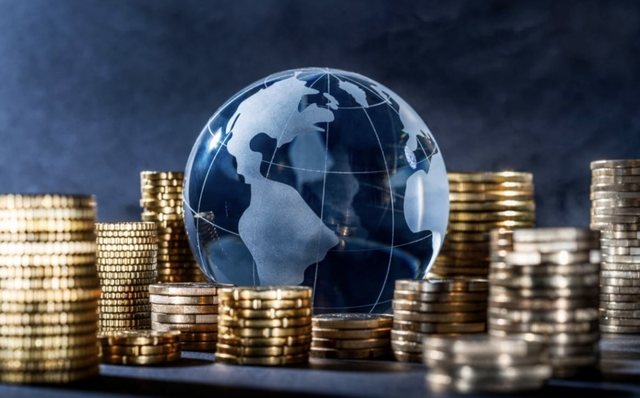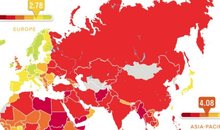
 Flash News
Flash News
Albania-Serbia match/ Tirana in "total lockdown": 2000 police officers, anti-drone checks and traffic restrictions
Etel Haxhiaj challenges US police during arrest of immigrant, charged with assault
Guard employee commits suicide with service weapon
Today the Parliament meets in plenary session, what is expected to be discussed/ Agenda
Morning Post/ In 2 lines: What mattered yesterday in Albania

The global economy is heading for its weakest period of growth since Covid-19, as Donald Trump's trade war hurts growth in major economies, including the US, according to forecasts from the Organisation for Economic Co-operation and Development (OECD).
The organization lowered the outlook for global output and most major G20 economies, while warning that agreements to ease trade barriers would be key in reviving investment and avoiding higher prices.
Global growth is expected to be 2.9% in 2025 and 2026, the OECD said in its latest outlook. The figure has exceeded 3% every year since 2020, when output fell due to the pandemic.
US growth will slow in particular, falling from 2.8% last year to just 1.6% in 2025 and 1.5% in 2026, while a period of higher inflation will prevent the Federal Reserve from cutting rates this year, the OECD said.
The latest estimate represents a downgrade from its March interim forecasts, which preceded the US president's tariff announcements on April 2. Even then, the OECD warned of a significant impact stemming from the Trump administration's tariffs and related policy uncertainty.
Trump has since partially reduced some duties, but the increase in the average effective US tariff rate is still "unprecedented", from 2.5% to over 15% - the highest since World War II, the OECD noted.
The organization also lowered its 2025 forecasts for G20 countries, including China, France, India, Japan, South Africa and the United Kingdom, compared with the March outlook.
Álvaro Pereira, the OECD’s chief economist, said countries urgently needed to reach agreements that would lower trade barriers. “Otherwise, the impact on growth will be quite significant,” he said. “This has massive consequences for everyone.”
Compared to the OECD's last full outlook in December, growth prospects for almost all countries have declined, Pereira said.
Another obstacle to growth and investment is uncertainty about the direction of global trade policy. US tariff swings have played a role, as Trump has imposed tariffs on China before partially rolling back the measures, while threatening higher tariffs on other economies, including the EU.
Trump has also pledged to impose a series of sectoral barriers, including doubling taxes on steel and aluminum imports to 50%.
The OECD prepared the economic forecasts assuming that tariff rates would be kept unchanged from mid-May, despite setbacks, including a court ruling last week that found Trump had exceeded his authority in imposing the April 2 tariffs.
Partly as a result, U.S. inflation is now expected to rise to nearly 4% by the end of 2025 and remain above the Federal Reserve's target in 2026, meaning the central bank will probably wait until next year before cutting interest rates, the OECD said.
Recent indicators showed a "marked cooling" of real GDP growth in the US, along with a significant rise in inflation expectations, she warned.
Overall, the OECD's outlook for this year has been lowered for about three-quarters of G20 members compared with its March interim forecast.
China's growth will slow from 5% last year to 4.7% in 2025 and 4.3% in 2026, according to the new outlook, while the Eurozone will expand by just 1% this year and 1.2% in 2026.
Japan's economy will grow by just 0.7% and 0.4% this year and next. The UK economy was forecast to expand by 1.3% this year and 1% in 2026 - a reduction from the expected rates of 1.4% and 1.2% respectively in March.
Global trade will expand by 2.8% in 2025 and 2.2% in 2026, significantly lower than the OECD's December forecasts.
Fiscal risks are rising along with trade tensions, the OECD warned, with demands for more defense spending expected to add to spending pressures.
“Historically high” stock valuations are increasing sensitivity to negative shocks in financial markets.
A prolonged period of weak investment has exacerbated the long-term challenges facing OECD economies, further damaging growth prospects. / Monitor
Latest news



Muslims celebrate Eid al-Adha, KMSH announces where prayers will be held
2025-06-05 11:24:50
Bardhi: The EU delegation said that crime controlled the elections in Elbasan!
2025-06-05 11:16:51


Journalists were censored by Spiropali, AGSH: Fraud and institutional propaganda
2025-06-05 11:00:20
Noka-majority: The foundations of your power rest on the bought vote
2025-06-05 10:54:00
Analysis: Peace between Russia and Ukraine, further away than it seemed
2025-06-05 10:51:57

Serious in Austria/ 35-year-old Albanian dies at work
2025-06-05 10:21:00

They produced and sold cannabis, 2 brothers arrested
2025-06-05 09:50:30

Guard employee commits suicide with service weapon
2025-06-05 09:15:00
Accident in Fier/ Car collides with an agricultural vehicle, 3 people injured
2025-06-05 09:08:55


Parashikimi i motit për sot
2025-06-05 08:31:59
HOROSCOPE/ Here's what the stars have predicted for each sign
2025-06-05 08:16:17
Morning Post/ In 2 lines: What mattered yesterday in Albania
2025-06-05 07:52:36
Video/ Abin Kurti narrowly escapes, almost falling down the stairs
2025-06-04 22:54:08
The first case of small cattle plague in the country is confirmed
2025-06-04 22:36:54

Blushi: The person who kidnapped Meta became police chief
2025-06-04 21:45:24
"Fraud" with the forgiveness of State Police fines!
2025-06-04 21:15:22



"The real reason why young Albanians like me are coming to the UK illegally"
2025-06-04 20:07:39
Government opens a legal path for investments in Army properties
2025-06-04 19:49:25
Elderly woman forgets stove on, house burns down in Vlora
2025-06-04 19:46:42

Ersekë/ Elderly man struck by lightning, dies on the spot
2025-06-04 19:12:55
Trump calls Putin, warns Ukraine that Russia will respond to attack on airbases
2025-06-04 19:05:56
Zelensky's Chief of Staff Meets with Secretary Rubio in Washington
2025-06-04 18:53:37

Rama opens a legal "path" for investments in Army properties
2025-06-04 18:41:33
How to think like a Stoic
2025-06-04 18:19:02

May 11th Elections/Balliu: The European Parliament condemned the electoral farce
2025-06-04 18:05:14


Tirana Pyramid “symbol of exclusion” for people with disabilities
2025-06-04 17:32:27



SPAK sends Evis Berberi, Belinda Balluku's right-hand man, for trial
2025-06-04 16:39:23


Reporting to the Parliament of independent institutions postponed indefinitely
2025-06-04 16:11:48

Turkish court jails five mayors of largest opposition party
2025-06-04 15:56:26



KAS vendos hapjen e 229 kutive të materialeve zgjedhore të Qarkut Vlorë
2025-06-04 15:04:47


Flax seeds, positive and negative effects of their consumption
2025-06-04 14:45:19
Housing costs are not increasing, apartment prices are
2025-06-04 14:39:07

A 51-year-old man was injured while working at the ferrochrome plant in Elbasan.
2025-06-04 14:14:12




Italian university engulfed in flames, student evacuation begins quickly
2025-06-04 13:28:22
39-year-old woman disappears in Gjirokastra, husband: She didn't come home
2025-06-04 13:15:24

The saga of failures to constitute the Kosovo Assembly continues!
2025-06-04 12:56:25
Government villas will be turned into luxury hotels
2025-06-04 12:51:21
Artan Tafani testifies for the first time against Laert Haxhiu's gang
2025-06-04 12:24:57

Scary figures: 8 in 10 Albanians believe the healthcare system is corrupt
2025-06-04 12:08:18


Constitutional Court reviews TikTok shutdown decision
2025-06-04 11:45:24
75-year-old man disappears in Korça! His wife: He has been gone for two days
2025-06-04 11:32:25





Iran rejects US demand for uranium enrichment
2025-06-04 10:15:32
Hoxha: An Albanian was caught distributing cocaine in the Russia-Ukraine war
2025-06-04 10:01:32
A safe was robbed, two people were arrested in Tirana
2025-06-04 09:54:36
Popular singer Jessie J diagnosed with breast cancer
2025-06-04 09:49:34
Young man arrested in Lazart for carrying gun and gun in apartment
2025-06-04 09:33:08
Call center fraud, two arrested in Tirana
2025-06-04 09:24:53

How is China exploiting the West's retreat to expand its presence in the region?
2025-06-04 09:07:32
Over a million pilgrims begin Hajj pilgrimage
2025-06-04 08:52:44

Banks ask the Bank of Albania to facilitate loans for PPPs in infrastructure
2025-06-04 08:29:07
Horoscope, what do the stars have in store for you today?
2025-06-04 08:16:36

Morning Post/ In 2 lines: What mattered yesterday in Albania
2025-06-04 07:47:17
Analyst: Political acts have damaged Albania more than criminal gangs
2025-06-03 23:00:19
